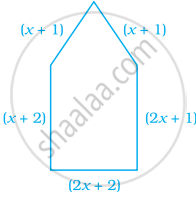Advertisements
Advertisements
प्रश्न
The sum of three consecutive odd natural numbers is 69. Find the prime number out of these numbers.
उत्तर
Let us assume three consecutive odd numbers of series to be x, x + 2 and x + 4
So, the sum of consecutive even numbers = x + x + 2 + x + 4 = 69
3x + 6 = 69
3x = 69 – 6
3x = 63
x = 21
Therefore, Three consecutive odd numbers = x, x + 2 and x + 4
x + 2 = 21 + 2
= 23
x + 4 = 21 + 4
= 25
Prime number = 23.
APPEARS IN
संबंधित प्रश्न
Two numbers are in the ratio 5:3. If they differ by 18, what are the numbers?
Three consecutive integers add up to 51. What are these integers?
The ages of Rahul and Haroon are in the ratio 5:7. Four years later the sum of their ages will be 56 years. What are their present ages?
I have a total of Rs 300 in coins of denomination Re 1, Rs 2 and Rs 5. The number of Rs 2 coins is 3 times the number of Rs 5 coins. The total number of coins is 160. How many coins of each denomination are with me?
What should be added to twice the rational number `(-7)/3 "to get" 3/7`?
Deveshi has a total of ₹ 590 as currency notes in the denominations of ₹ 50, ₹ 20, and ₹ 10. The ratio of the number of ₹ 50 notes and ₹ 20 notes is 3: 5. If she has a total of 25 notes, how many notes of each denomination she has?
The sum of three consecutive multiples of 7 is 357. Find the smallest multiple.
If the sum of two consecutive numbers is 93 and one of them is x, then the other number is 93 – x.
The perimeter of a rectangle is 240 cm. If its length is increased by 10% and its breadth is decreased by 20%, we get the same perimeter. Find the length and breadth of the rectangle.
For what value of x is the perimeter of shape 77 cm?

